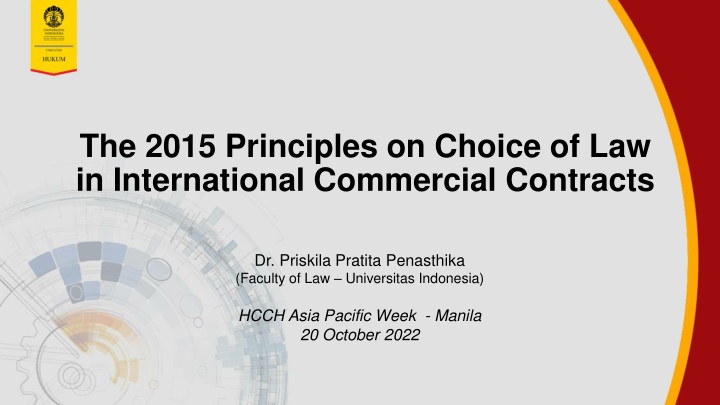
The 2015 Principles on Choice of Law in International Commercial Contracts by Dr. Priskila Pratita Penasthika
Explore the key aspects of the 2015 Principles on Choice of Law in International Commercial Contracts developed by Dr. Priskila Pratita Penasthika, including its purpose, application conditions, freedom of choice, severability, and more.
Download Presentation

Please find below an Image/Link to download the presentation.
The content on the website is provided AS IS for your information and personal use only. It may not be sold, licensed, or shared on other websites without obtaining consent from the author. If you encounter any issues during the download, it is possible that the publisher has removed the file from their server.
You are allowed to download the files provided on this website for personal or commercial use, subject to the condition that they are used lawfully. All files are the property of their respective owners.
The content on the website is provided AS IS for your information and personal use only. It may not be sold, licensed, or shared on other websites without obtaining consent from the author.
E N D
Presentation Transcript
The 2015 Principles on Choice of Law in International Commercial Contracts Dr. Priskila Pratita Penasthika (Faculty of Law Universitas Indonesia) HCCH Asia Pacific Week - Manila 20 October 2022
The 2015 Principles: an Overview Initiated in June 2006. Formally approved by the HCCH on 19 March 2015. The first non-binding instrument developed by the HCCH. Main goal: to promote the acceptance of party autonomy in international commercial contracts. Preamble, 12 Articles and Commentary.
Why Principles, not a Convention? 1. acknowledge and give effect divergence among countries towards choice of law A non-binding instrument is considered more appropriate 2. have no clear rules 3. reject
The 2015 Principles: Envisaged Users Lawmakers Parties/ Courts/ Legal Advisors Arbitral Tribunals
Conditions of Application CONTRACT International Commercial UNLESS parties have establishment in the same State all elements only connect to that state. (Art. 1(2)) Each party is acting in the exercise of its trade or profession. excludes: consumer and employment contracts (Art.1(1))
The 2015 Principles: Freedom of Choice A contract is governed by the law chosen by the parties. (Art. 2) may apply to the whole or only part of the contract may be made or modified at anytime no connection required
The 2015 Principles Severability of the choice of law clause (Art.7) express and tacit choice (Art.4) Choice of Law No Formal Requirement Exclusion of Renvoi (Art. 8) (Art. 5) The law governing the choice of law What are governed by the chosen law? (Art. 9) (Art. 6)
The 2015 Principles do not address the situation of absence of choice of law by the parties
The 2015 Principles: the novelty unless the law of the forum provides otherwise. Rules of Law (Art. 3) generally accepted on an international, supranational, or regional level as a neutral and balanced set of rules. Ex: UNIDROIT PICC, PECL, and CISG
The 2015 Principles: Limits of Choice of Law Overriding Mandatory Provisions Public Policy (ordre public) of the law that would be applicable in the absence of choice of law of the forum of another law of the forum
The 2015 Principles: Inspiration for Paraguayan Law 5393 on the Law Applicable to International Contracts in January 2015. Uruguay - Ley General de Derecho Internacional Privado 130/2020 The (draft) of African Principles on the Law Applicable to International Commercial Contracts
Draft of the APPIL Asian Principles of Private International Law (APPIL) is an instrument harmonising PIL rules in countries in East and Southeast Asia, firstly initiated in 2015. The choice of law provisions in APPIL were inspired mainly by the 2015 Principles. Other references: the Rome I Regulation, the Mexico Convention, and the UNIDROIT PICC. The APPIL drafting process has been completed, and this instrument is expected to be released in the near future.
Indonesia: The Draft of PIL Bill a choice of a law commonly or widely used in civil and commercial matters at international or regional level Article 3 the 2015 Principles A choice of Indonesian court A choice of Indonesian law Article 4 the 2015 Principles the severability of the choice of law agreement Article 7 the 2015 Principles
Arbitration Annual survey of arbitration institutions started in October 2020 by the HCCH 88% of the participants consider their arbitration rules to be consistent with the 2015 Principles 13 arbitration institutions from 9 countries in the APAC participated 3rd Survey: As of March 2022, 25 arbitrations institutions recorded
Concluding Remarks The 2015 Principles aim to promote the acceptance of party autonomy in international commercial contracts. Given its non-binding nature, the 2015 Principles give their envisaged users the necessary latitude as regards to what extent they want to embrace the Principles. It remains interesting to observe how the 2015 Principles continuously serve as a viable reference in furthering choice of law rules at the national and regional levels.
THANK YOU Priskila Pratita Penasthika Assistant Professor of Private International Law Faculty of Law Universitas Indonesia priskila.pratita31@office.ui.ac.id
